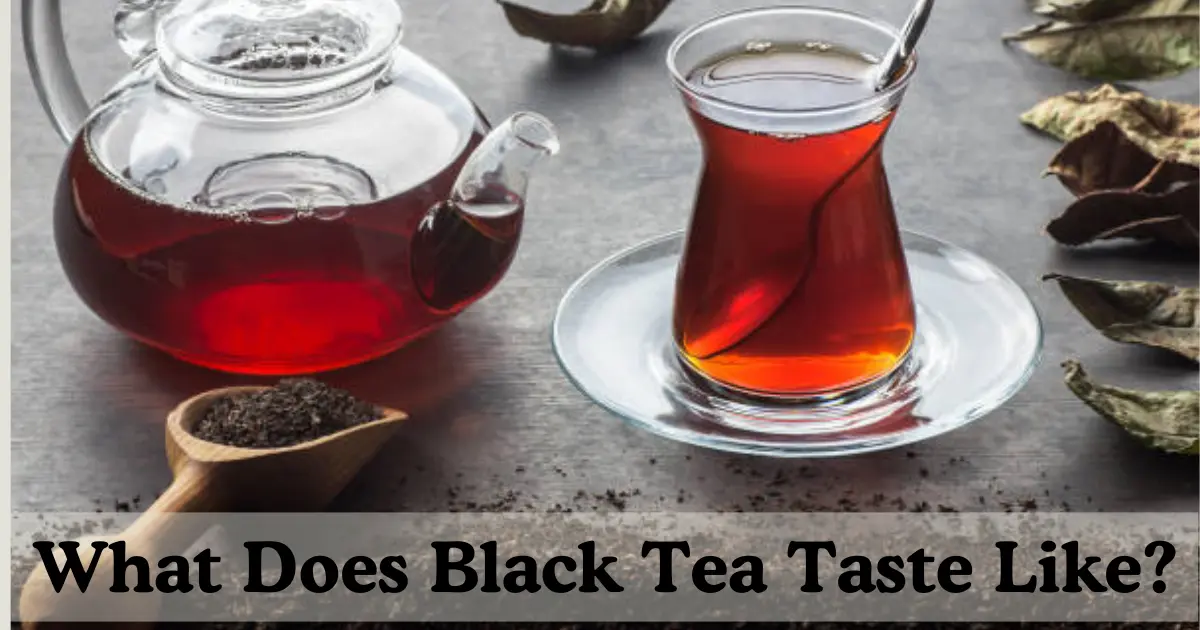Black tea is one of the most popular beverages worldwide, celebrated for its bold and robust flavor. It originates from the leaves of the Camellia sinensis plant, just like green, white, and oolong teas. But what does black tea taste like, and how does it differ from other teas? In this article, we’ll dive deep into its flavor profile, factors that influence its taste, and answer common questions such as whether black tea is sweet or bitter, how it compares to green tea, and if adding milk improves its taste. This article explores how black tea’s distinct taste has made it a versatile drink—enjoyed plain, sweetened, or with milk.
What Does Black Tea Taste Like?
Black tea boasts a wide range of flavors, from malty and earthy to fruity and floral. The primary notes are:
- Bold and Robust: Black tea typically has a strong and full-bodied taste.
- Malty and Sweet: Certain varieties, like Assam, have a natural sweetness.
- Astringent and Slightly Bitter: The astringency provides a refreshing aftertaste.
Factors That Influence the Flavor of Black Tea
Several factors affect the flavor profile of black tea:
| Factor | Impact on Taste |
|---|---|
| Region of Growth | Assam teas are malty; Darjeeling teas are floral and light. |
| Oxidation Level | More oxidation results in stronger, darker flavors. |
| Brewing Technique | Over-brewing increases bitterness; optimal brewing preserves balance. |
| Additives | Milk and sugar soften astringency and bitterness. |
Taste Notes of Popular Black Teas
| Type of Black Tea | Flavor Profile |
|---|---|
| Assam | Malty, bold, slightly sweet |
| Darjeeling | Floral, fruity, and light |
| Earl Grey | Citrusy with a hint of bergamot |
| Keemun | Smoky, smooth, with a hint of fruitiness |
| Lapsang Souchong | Strong smoky flavor |
Is Black Tea Sweet or Bitter?
Black tea’s sweetness or bitterness depends on its preparation and type.
- Naturally Sweet: Some varieties like Assam and Darjeeling have inherent sweet undertones.
- Bitter Notes: Over-steeping or brewing at high temperatures can release tannins, resulting in bitterness.
To achieve a balanced cup, steep black tea for 3–5 minutes at 190–205°F (88–96°C).
What Tastes Better: Black or Green Tea?
The preference between black and green tea often comes down to personal taste.
Key Differences in Flavor:
| Aspect | Black Tea | Green Tea |
|---|---|---|
| Flavor | Bold, robust, malty, or astringent | Grassy, vegetal, fresh |
| Aroma | Earthy and warm | Floral or herbal |
| Caffeine Content | Higher | Lower |
| Brew Color | Dark amber to reddish-brown | Pale yellow to green |
Does Black Tea Taste Good With Milk?
Yes, black tea pairs well with milk, especially varieties like Assam and English Breakfast. Milk adds creaminess and reduces the astringency, making the tea smoother and richer.
Tips for Making the Perfect Milk Tea:
- Brew a strong cup of black tea to retain its bold flavor.
- Add warmed or frothed milk gradually to balance the taste.
- Sweeten with sugar or honey, if desired.
Conclusion
Black tea is an incredibly versatile beverage with a rich flavor profile ranging from malty and sweet to bold and astringent. Its taste can vary widely depending on the region, oxidation process, and brewing method. Whether enjoyed plain, sweetened, or with milk, black tea offers something for every palate.
When choosing between black and green tea, consider your flavor preferences—black tea is robust and earthy, while green tea is grassy and refreshing. Adding milk can elevate the creaminess of black tea, especially in blends like Assam or English Breakfast.
FAQs
What does black tea taste like compared to coffee?
Black tea is less bitter and acidic than coffee, with a smoother, malty flavor.
Is black tea naturally sweet?
Yes, some varieties like Assam and Darjeeling have natural sweetness due to their terroir.
How can I reduce bitterness in black tea?
Steep it for 3–5 minutes and avoid boiling water to prevent over-extraction.
What type of black tea tastes best with milk?
Assam and English Breakfast teas are excellent choices for milk tea.
Can black tea taste fruity?
Yes, varieties like Darjeeling and Keemun have fruity undertones.
Experimenting with different brewing techniques and tea types will help you uncover your ideal cup. Enjoy exploring the delightful world of black tea!

